Partnership Working in Health and Social Care: An Analysis Report
VerifiedAdded on 2021/01/01
|12
|3881
|131
Report
AI Summary
This report examines the concept of partnership working within the context of health and social care, specifically focusing on the NHS. It defines partnership as a collaborative relationship built on trust and mutual understanding to achieve specific goals. The report explores the features of effective partnership working, highlighting the importance of trust, communication, and active listening. It analyzes the impact of partnership working on delivering better outcomes, discussing the roles of colleagues, other professionals, and service users. The report also addresses barriers to partnership working and proposes solutions such as team meetings, information sharing, and open communication. Additionally, the report details the author's roles and responsibilities when working with colleagues and other professionals, including developing common objectives and managing conflict. Procedures for establishing effective working relationships are discussed, emphasizing the importance of multidisciplinary working, clear objectives, and effective planning. The report concludes by emphasizing the overall significance of partnership working in achieving improved healthcare and social care results.
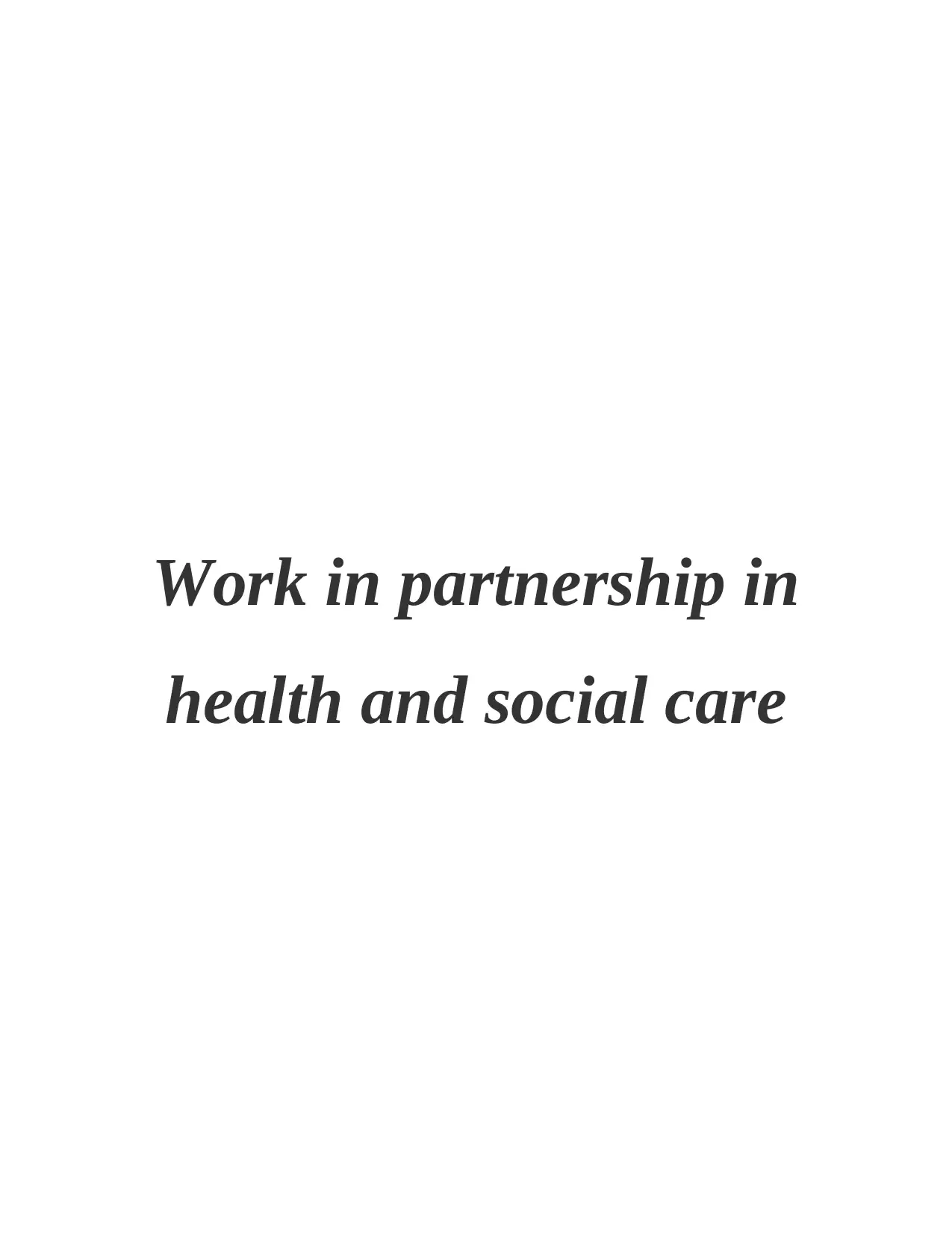
Work in partnership in
health and social care
health and social care
Paraphrase This Document
Need a fresh take? Get an instant paraphrase of this document with our AI Paraphraser
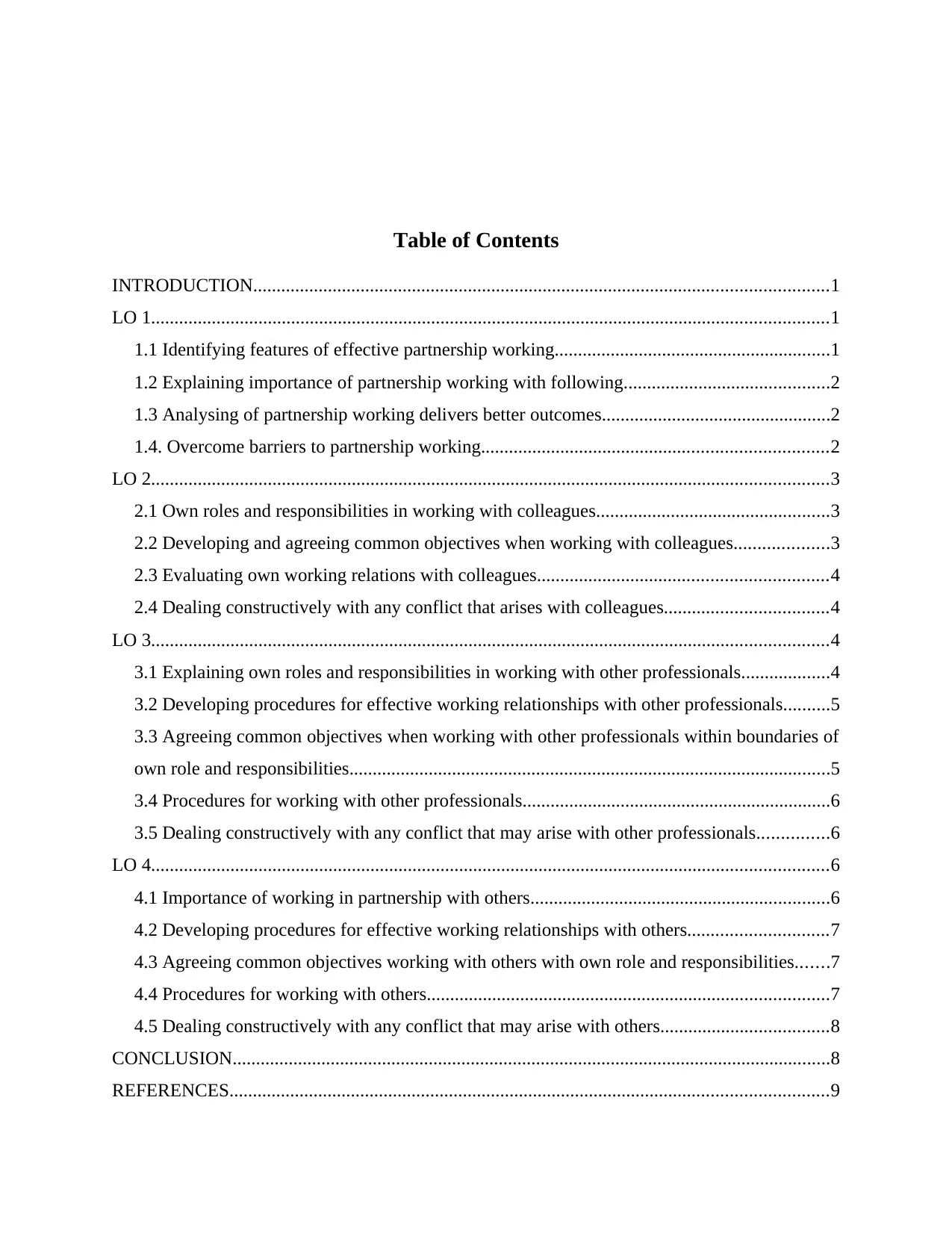
Table of Contents
INTRODUCTION...........................................................................................................................1
LO 1.................................................................................................................................................1
1.1 Identifying features of effective partnership working...........................................................1
1.2 Explaining importance of partnership working with following............................................2
1.3 Analysing of partnership working delivers better outcomes.................................................2
1.4. Overcome barriers to partnership working..........................................................................2
LO 2.................................................................................................................................................3
2.1 Own roles and responsibilities in working with colleagues..................................................3
2.2 Developing and agreeing common objectives when working with colleagues....................3
2.3 Evaluating own working relations with colleagues..............................................................4
2.4 Dealing constructively with any conflict that arises with colleagues...................................4
LO 3.................................................................................................................................................4
3.1 Explaining own roles and responsibilities in working with other professionals...................4
3.2 Developing procedures for effective working relationships with other professionals..........5
3.3 Agreeing common objectives when working with other professionals within boundaries of
own role and responsibilities.......................................................................................................5
3.4 Procedures for working with other professionals..................................................................6
3.5 Dealing constructively with any conflict that may arise with other professionals...............6
LO 4.................................................................................................................................................6
4.1 Importance of working in partnership with others................................................................6
4.2 Developing procedures for effective working relationships with others..............................7
4.3 Agreeing common objectives working with others with own role and responsibilities.......7
4.4 Procedures for working with others......................................................................................7
4.5 Dealing constructively with any conflict that may arise with others....................................8
CONCLUSION................................................................................................................................8
REFERENCES................................................................................................................................9
INTRODUCTION...........................................................................................................................1
LO 1.................................................................................................................................................1
1.1 Identifying features of effective partnership working...........................................................1
1.2 Explaining importance of partnership working with following............................................2
1.3 Analysing of partnership working delivers better outcomes.................................................2
1.4. Overcome barriers to partnership working..........................................................................2
LO 2.................................................................................................................................................3
2.1 Own roles and responsibilities in working with colleagues..................................................3
2.2 Developing and agreeing common objectives when working with colleagues....................3
2.3 Evaluating own working relations with colleagues..............................................................4
2.4 Dealing constructively with any conflict that arises with colleagues...................................4
LO 3.................................................................................................................................................4
3.1 Explaining own roles and responsibilities in working with other professionals...................4
3.2 Developing procedures for effective working relationships with other professionals..........5
3.3 Agreeing common objectives when working with other professionals within boundaries of
own role and responsibilities.......................................................................................................5
3.4 Procedures for working with other professionals..................................................................6
3.5 Dealing constructively with any conflict that may arise with other professionals...............6
LO 4.................................................................................................................................................6
4.1 Importance of working in partnership with others................................................................6
4.2 Developing procedures for effective working relationships with others..............................7
4.3 Agreeing common objectives working with others with own role and responsibilities.......7
4.4 Procedures for working with others......................................................................................7
4.5 Dealing constructively with any conflict that may arise with others....................................8
CONCLUSION................................................................................................................................8
REFERENCES................................................................................................................................9
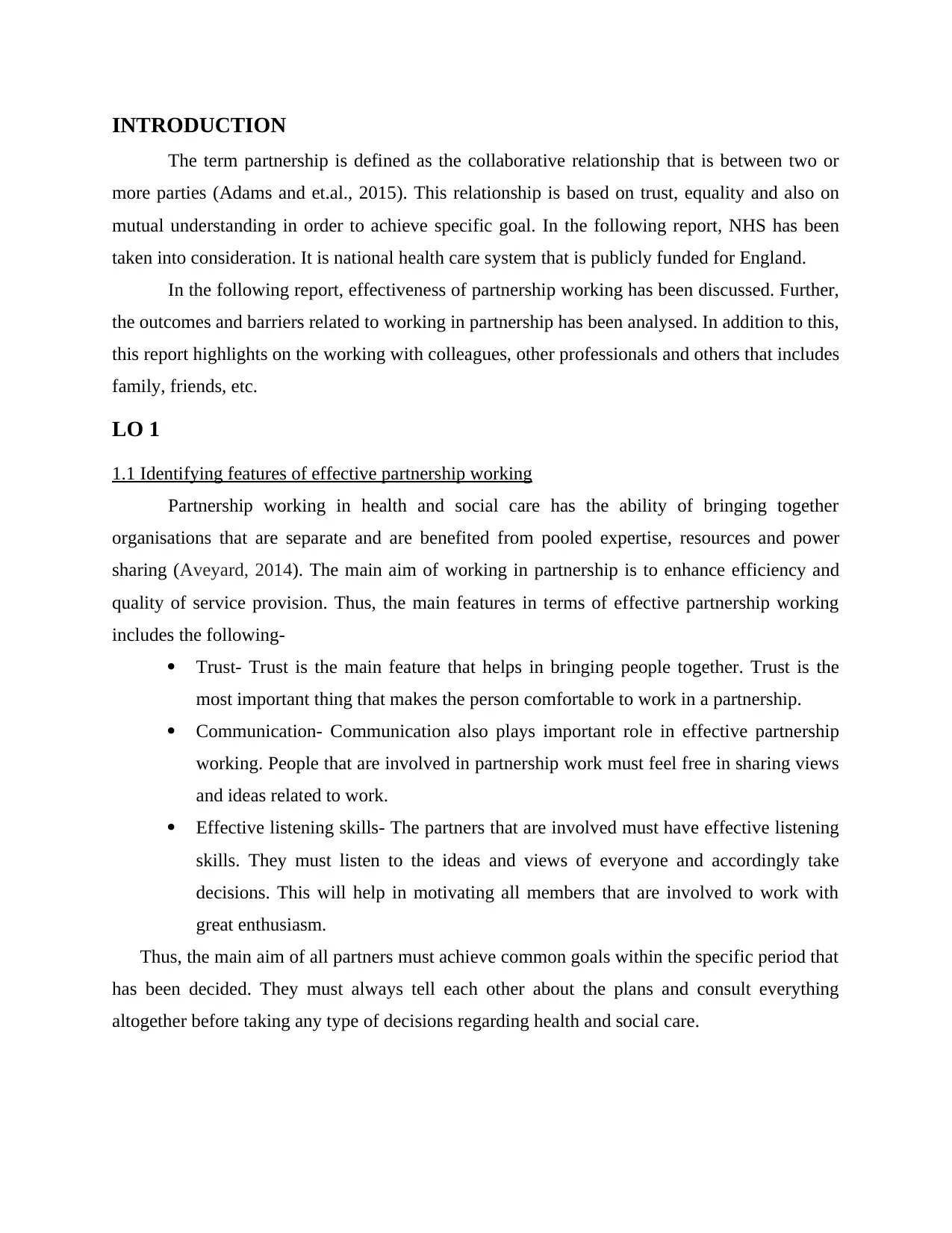
INTRODUCTION
The term partnership is defined as the collaborative relationship that is between two or
more parties (Adams and et.al., 2015). This relationship is based on trust, equality and also on
mutual understanding in order to achieve specific goal. In the following report, NHS has been
taken into consideration. It is national health care system that is publicly funded for England.
In the following report, effectiveness of partnership working has been discussed. Further,
the outcomes and barriers related to working in partnership has been analysed. In addition to this,
this report highlights on the working with colleagues, other professionals and others that includes
family, friends, etc.
LO 1
1.1 Identifying features of effective partnership working
Partnership working in health and social care has the ability of bringing together
organisations that are separate and are benefited from pooled expertise, resources and power
sharing (Aveyard, 2014). The main aim of working in partnership is to enhance efficiency and
quality of service provision. Thus, the main features in terms of effective partnership working
includes the following-
Trust- Trust is the main feature that helps in bringing people together. Trust is the
most important thing that makes the person comfortable to work in a partnership.
Communication- Communication also plays important role in effective partnership
working. People that are involved in partnership work must feel free in sharing views
and ideas related to work.
Effective listening skills- The partners that are involved must have effective listening
skills. They must listen to the ideas and views of everyone and accordingly take
decisions. This will help in motivating all members that are involved to work with
great enthusiasm.
Thus, the main aim of all partners must achieve common goals within the specific period that
has been decided. They must always tell each other about the plans and consult everything
altogether before taking any type of decisions regarding health and social care.
The term partnership is defined as the collaborative relationship that is between two or
more parties (Adams and et.al., 2015). This relationship is based on trust, equality and also on
mutual understanding in order to achieve specific goal. In the following report, NHS has been
taken into consideration. It is national health care system that is publicly funded for England.
In the following report, effectiveness of partnership working has been discussed. Further,
the outcomes and barriers related to working in partnership has been analysed. In addition to this,
this report highlights on the working with colleagues, other professionals and others that includes
family, friends, etc.
LO 1
1.1 Identifying features of effective partnership working
Partnership working in health and social care has the ability of bringing together
organisations that are separate and are benefited from pooled expertise, resources and power
sharing (Aveyard, 2014). The main aim of working in partnership is to enhance efficiency and
quality of service provision. Thus, the main features in terms of effective partnership working
includes the following-
Trust- Trust is the main feature that helps in bringing people together. Trust is the
most important thing that makes the person comfortable to work in a partnership.
Communication- Communication also plays important role in effective partnership
working. People that are involved in partnership work must feel free in sharing views
and ideas related to work.
Effective listening skills- The partners that are involved must have effective listening
skills. They must listen to the ideas and views of everyone and accordingly take
decisions. This will help in motivating all members that are involved to work with
great enthusiasm.
Thus, the main aim of all partners must achieve common goals within the specific period that
has been decided. They must always tell each other about the plans and consult everything
altogether before taking any type of decisions regarding health and social care.
⊘ This is a preview!⊘
Do you want full access?
Subscribe today to unlock all pages.

Trusted by 1+ million students worldwide
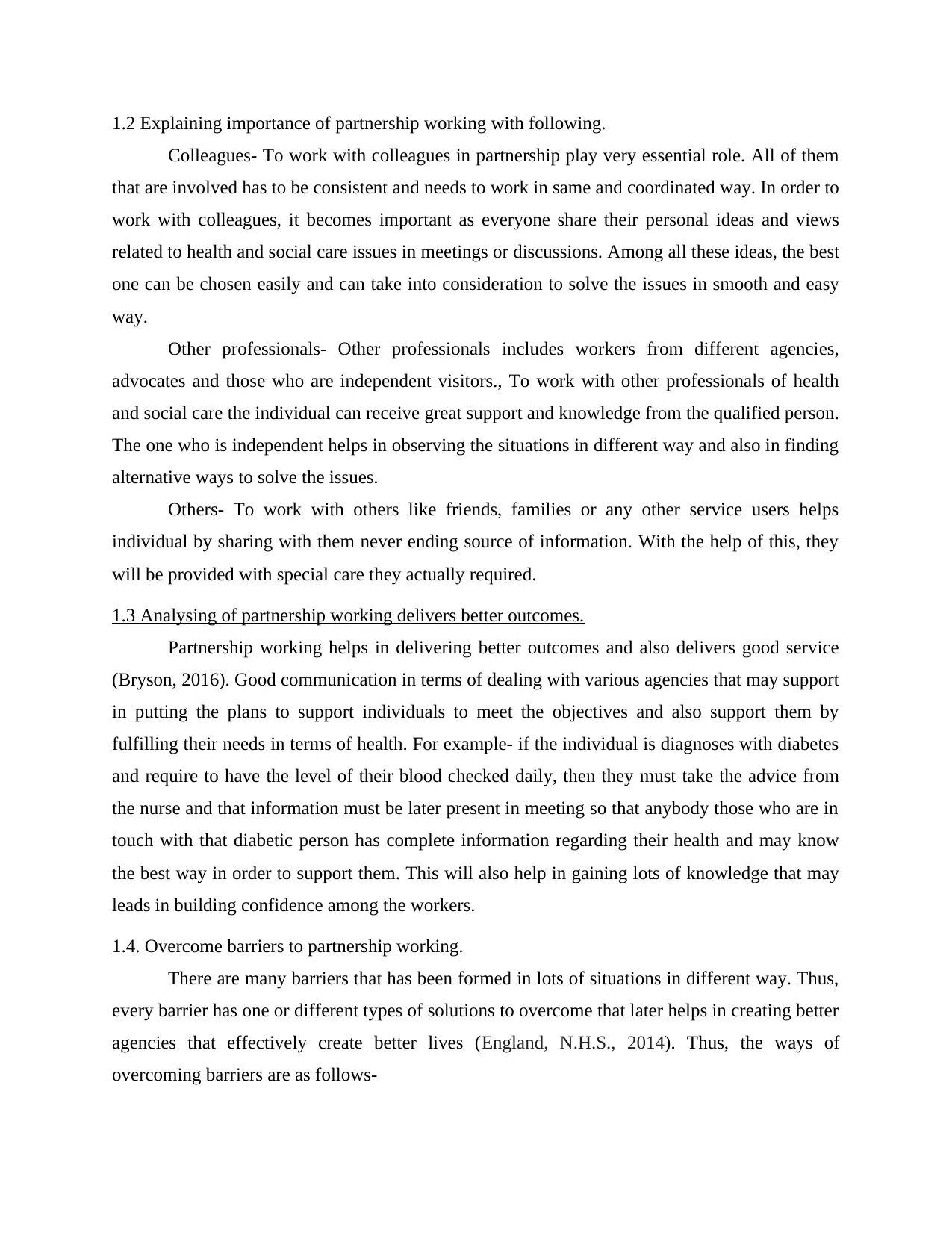
1.2 Explaining importance of partnership working with following.
Colleagues- To work with colleagues in partnership play very essential role. All of them
that are involved has to be consistent and needs to work in same and coordinated way. In order to
work with colleagues, it becomes important as everyone share their personal ideas and views
related to health and social care issues in meetings or discussions. Among all these ideas, the best
one can be chosen easily and can take into consideration to solve the issues in smooth and easy
way.
Other professionals- Other professionals includes workers from different agencies,
advocates and those who are independent visitors., To work with other professionals of health
and social care the individual can receive great support and knowledge from the qualified person.
The one who is independent helps in observing the situations in different way and also in finding
alternative ways to solve the issues.
Others- To work with others like friends, families or any other service users helps
individual by sharing with them never ending source of information. With the help of this, they
will be provided with special care they actually required.
1.3 Analysing of partnership working delivers better outcomes.
Partnership working helps in delivering better outcomes and also delivers good service
(Bryson, 2016). Good communication in terms of dealing with various agencies that may support
in putting the plans to support individuals to meet the objectives and also support them by
fulfilling their needs in terms of health. For example- if the individual is diagnoses with diabetes
and require to have the level of their blood checked daily, then they must take the advice from
the nurse and that information must be later present in meeting so that anybody those who are in
touch with that diabetic person has complete information regarding their health and may know
the best way in order to support them. This will also help in gaining lots of knowledge that may
leads in building confidence among the workers.
1.4. Overcome barriers to partnership working.
There are many barriers that has been formed in lots of situations in different way. Thus,
every barrier has one or different types of solutions to overcome that later helps in creating better
agencies that effectively create better lives (England, N.H.S., 2014). Thus, the ways of
overcoming barriers are as follows-
Colleagues- To work with colleagues in partnership play very essential role. All of them
that are involved has to be consistent and needs to work in same and coordinated way. In order to
work with colleagues, it becomes important as everyone share their personal ideas and views
related to health and social care issues in meetings or discussions. Among all these ideas, the best
one can be chosen easily and can take into consideration to solve the issues in smooth and easy
way.
Other professionals- Other professionals includes workers from different agencies,
advocates and those who are independent visitors., To work with other professionals of health
and social care the individual can receive great support and knowledge from the qualified person.
The one who is independent helps in observing the situations in different way and also in finding
alternative ways to solve the issues.
Others- To work with others like friends, families or any other service users helps
individual by sharing with them never ending source of information. With the help of this, they
will be provided with special care they actually required.
1.3 Analysing of partnership working delivers better outcomes.
Partnership working helps in delivering better outcomes and also delivers good service
(Bryson, 2016). Good communication in terms of dealing with various agencies that may support
in putting the plans to support individuals to meet the objectives and also support them by
fulfilling their needs in terms of health. For example- if the individual is diagnoses with diabetes
and require to have the level of their blood checked daily, then they must take the advice from
the nurse and that information must be later present in meeting so that anybody those who are in
touch with that diabetic person has complete information regarding their health and may know
the best way in order to support them. This will also help in gaining lots of knowledge that may
leads in building confidence among the workers.
1.4. Overcome barriers to partnership working.
There are many barriers that has been formed in lots of situations in different way. Thus,
every barrier has one or different types of solutions to overcome that later helps in creating better
agencies that effectively create better lives (England, N.H.S., 2014). Thus, the ways of
overcoming barriers are as follows-
Paraphrase This Document
Need a fresh take? Get an instant paraphrase of this document with our AI Paraphraser
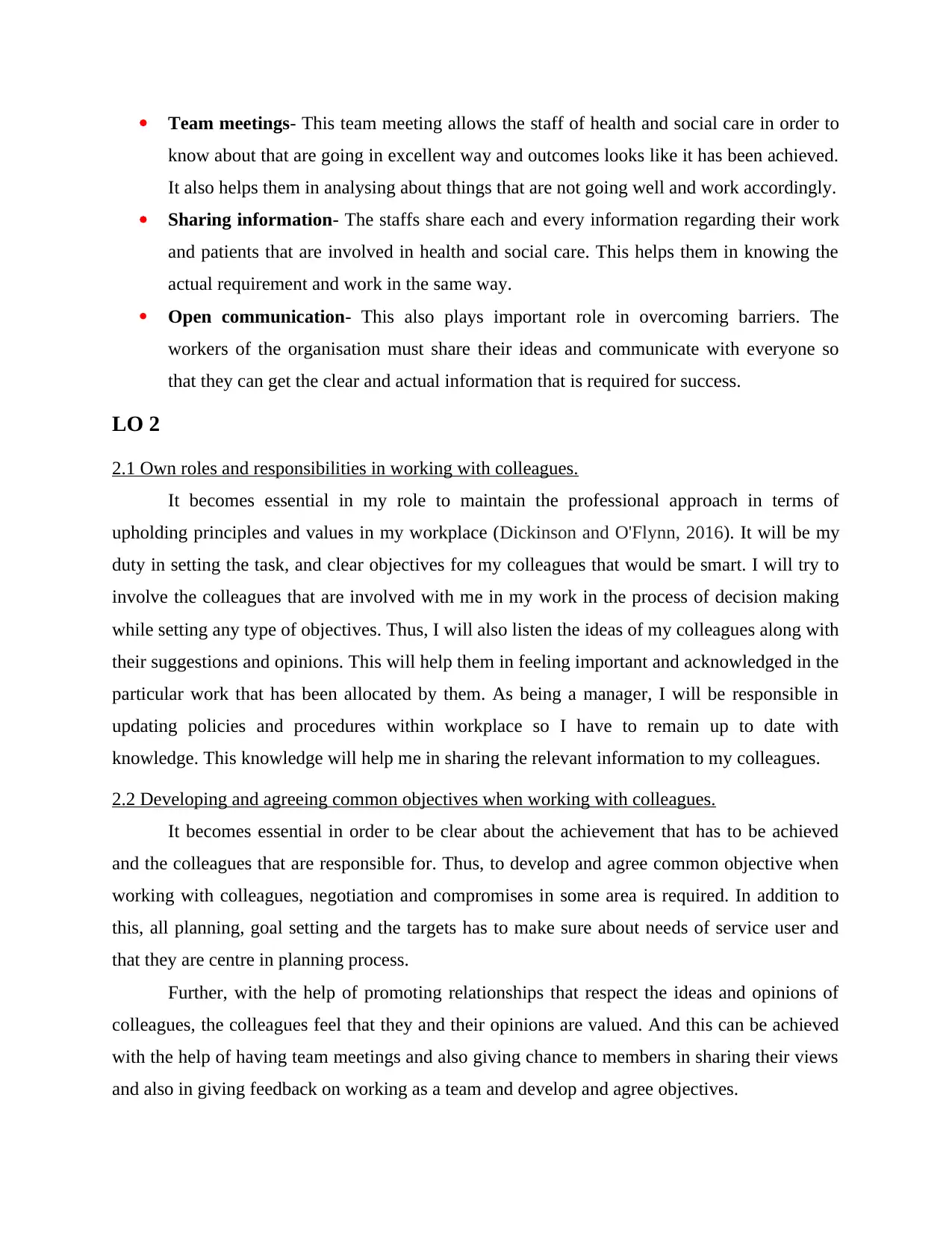
Team meetings- This team meeting allows the staff of health and social care in order to
know about that are going in excellent way and outcomes looks like it has been achieved.
It also helps them in analysing about things that are not going well and work accordingly.
Sharing information- The staffs share each and every information regarding their work
and patients that are involved in health and social care. This helps them in knowing the
actual requirement and work in the same way.
Open communication- This also plays important role in overcoming barriers. The
workers of the organisation must share their ideas and communicate with everyone so
that they can get the clear and actual information that is required for success.
LO 2
2.1 Own roles and responsibilities in working with colleagues.
It becomes essential in my role to maintain the professional approach in terms of
upholding principles and values in my workplace (Dickinson and O'Flynn, 2016). It will be my
duty in setting the task, and clear objectives for my colleagues that would be smart. I will try to
involve the colleagues that are involved with me in my work in the process of decision making
while setting any type of objectives. Thus, I will also listen the ideas of my colleagues along with
their suggestions and opinions. This will help them in feeling important and acknowledged in the
particular work that has been allocated by them. As being a manager, I will be responsible in
updating policies and procedures within workplace so I have to remain up to date with
knowledge. This knowledge will help me in sharing the relevant information to my colleagues.
2.2 Developing and agreeing common objectives when working with colleagues.
It becomes essential in order to be clear about the achievement that has to be achieved
and the colleagues that are responsible for. Thus, to develop and agree common objective when
working with colleagues, negotiation and compromises in some area is required. In addition to
this, all planning, goal setting and the targets has to make sure about needs of service user and
that they are centre in planning process.
Further, with the help of promoting relationships that respect the ideas and opinions of
colleagues, the colleagues feel that they and their opinions are valued. And this can be achieved
with the help of having team meetings and also giving chance to members in sharing their views
and also in giving feedback on working as a team and develop and agree objectives.
know about that are going in excellent way and outcomes looks like it has been achieved.
It also helps them in analysing about things that are not going well and work accordingly.
Sharing information- The staffs share each and every information regarding their work
and patients that are involved in health and social care. This helps them in knowing the
actual requirement and work in the same way.
Open communication- This also plays important role in overcoming barriers. The
workers of the organisation must share their ideas and communicate with everyone so
that they can get the clear and actual information that is required for success.
LO 2
2.1 Own roles and responsibilities in working with colleagues.
It becomes essential in my role to maintain the professional approach in terms of
upholding principles and values in my workplace (Dickinson and O'Flynn, 2016). It will be my
duty in setting the task, and clear objectives for my colleagues that would be smart. I will try to
involve the colleagues that are involved with me in my work in the process of decision making
while setting any type of objectives. Thus, I will also listen the ideas of my colleagues along with
their suggestions and opinions. This will help them in feeling important and acknowledged in the
particular work that has been allocated by them. As being a manager, I will be responsible in
updating policies and procedures within workplace so I have to remain up to date with
knowledge. This knowledge will help me in sharing the relevant information to my colleagues.
2.2 Developing and agreeing common objectives when working with colleagues.
It becomes essential in order to be clear about the achievement that has to be achieved
and the colleagues that are responsible for. Thus, to develop and agree common objective when
working with colleagues, negotiation and compromises in some area is required. In addition to
this, all planning, goal setting and the targets has to make sure about needs of service user and
that they are centre in planning process.
Further, with the help of promoting relationships that respect the ideas and opinions of
colleagues, the colleagues feel that they and their opinions are valued. And this can be achieved
with the help of having team meetings and also giving chance to members in sharing their views
and also in giving feedback on working as a team and develop and agree objectives.
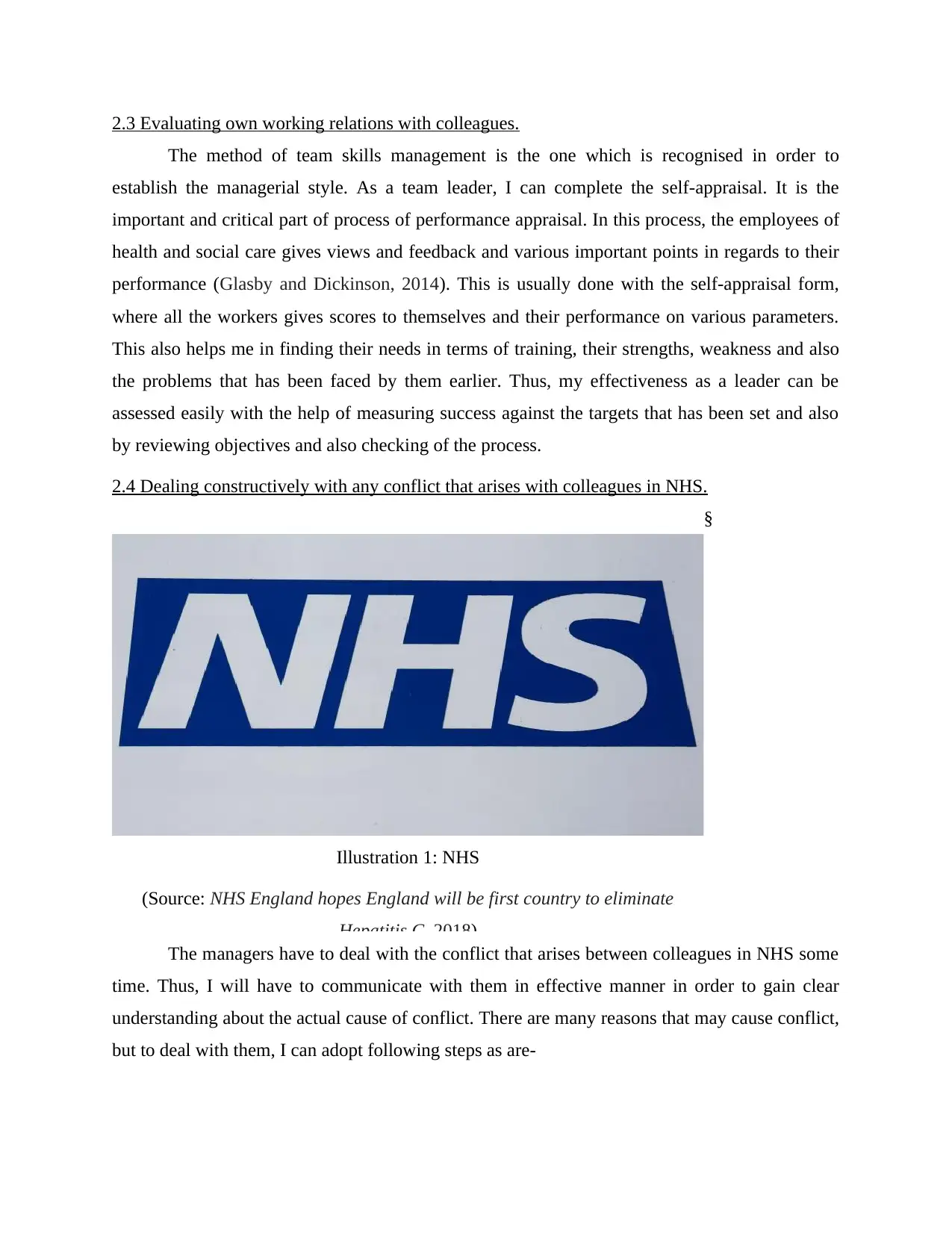
2.3 Evaluating own working relations with colleagues.
The method of team skills management is the one which is recognised in order to
establish the managerial style. As a team leader, I can complete the self-appraisal. It is the
important and critical part of process of performance appraisal. In this process, the employees of
health and social care gives views and feedback and various important points in regards to their
performance (Glasby and Dickinson, 2014). This is usually done with the self-appraisal form,
where all the workers gives scores to themselves and their performance on various parameters.
This also helps me in finding their needs in terms of training, their strengths, weakness and also
the problems that has been faced by them earlier. Thus, my effectiveness as a leader can be
assessed easily with the help of measuring success against the targets that has been set and also
by reviewing objectives and also checking of the process.
2.4 Dealing constructively with any conflict that arises with colleagues in NHS.
Illustration 1: NHS
(Source: NHS England hopes England will be first country to eliminate
Hepatitis C, 2018)
§
The managers have to deal with the conflict that arises between colleagues in NHS some
time. Thus, I will have to communicate with them in effective manner in order to gain clear
understanding about the actual cause of conflict. There are many reasons that may cause conflict,
but to deal with them, I can adopt following steps as are-
The method of team skills management is the one which is recognised in order to
establish the managerial style. As a team leader, I can complete the self-appraisal. It is the
important and critical part of process of performance appraisal. In this process, the employees of
health and social care gives views and feedback and various important points in regards to their
performance (Glasby and Dickinson, 2014). This is usually done with the self-appraisal form,
where all the workers gives scores to themselves and their performance on various parameters.
This also helps me in finding their needs in terms of training, their strengths, weakness and also
the problems that has been faced by them earlier. Thus, my effectiveness as a leader can be
assessed easily with the help of measuring success against the targets that has been set and also
by reviewing objectives and also checking of the process.
2.4 Dealing constructively with any conflict that arises with colleagues in NHS.
Illustration 1: NHS
(Source: NHS England hopes England will be first country to eliminate
Hepatitis C, 2018)
§
The managers have to deal with the conflict that arises between colleagues in NHS some
time. Thus, I will have to communicate with them in effective manner in order to gain clear
understanding about the actual cause of conflict. There are many reasons that may cause conflict,
but to deal with them, I can adopt following steps as are-
⊘ This is a preview!⊘
Do you want full access?
Subscribe today to unlock all pages.

Trusted by 1+ million students worldwide
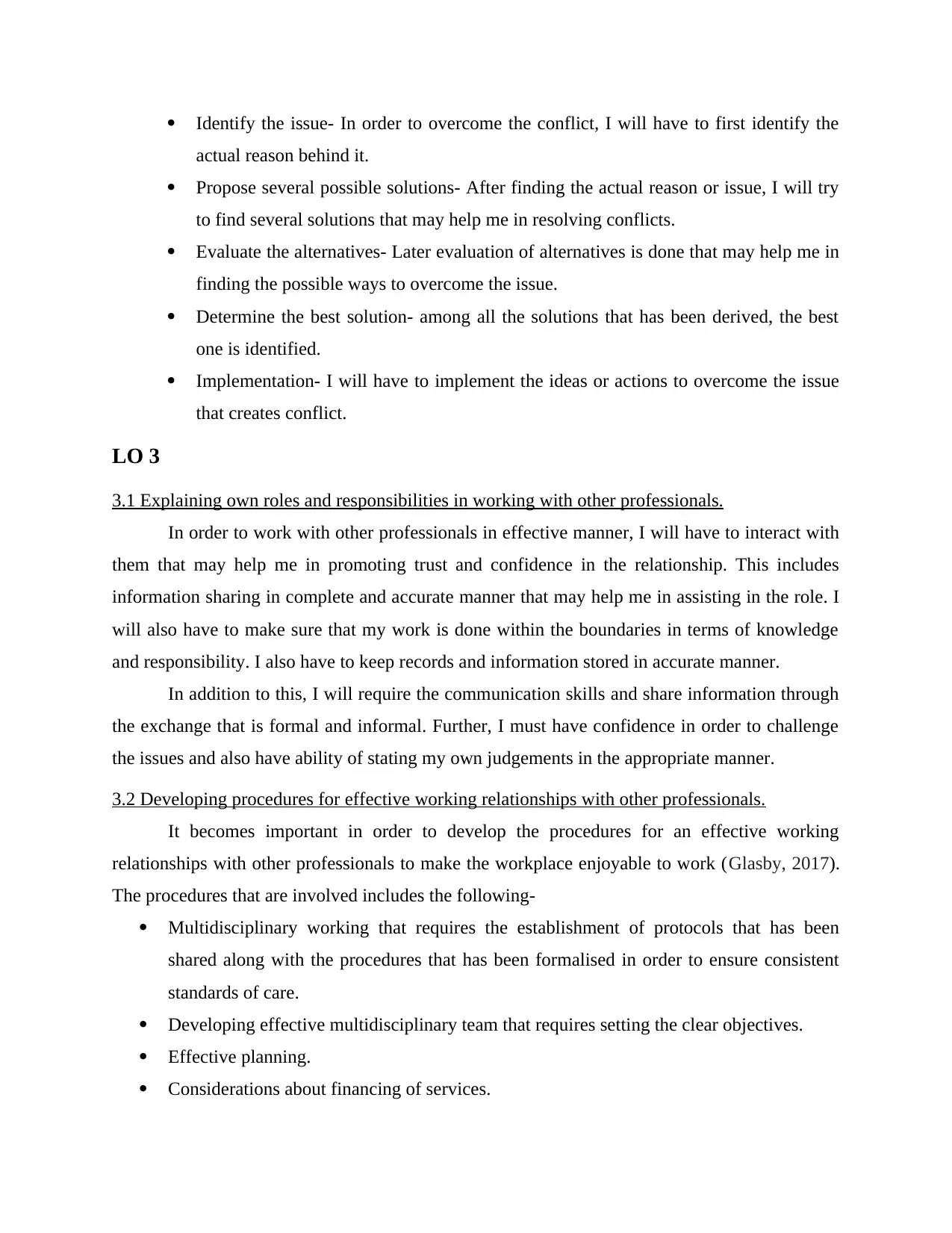
Identify the issue- In order to overcome the conflict, I will have to first identify the
actual reason behind it.
Propose several possible solutions- After finding the actual reason or issue, I will try
to find several solutions that may help me in resolving conflicts.
Evaluate the alternatives- Later evaluation of alternatives is done that may help me in
finding the possible ways to overcome the issue.
Determine the best solution- among all the solutions that has been derived, the best
one is identified.
Implementation- I will have to implement the ideas or actions to overcome the issue
that creates conflict.
LO 3
3.1 Explaining own roles and responsibilities in working with other professionals.
In order to work with other professionals in effective manner, I will have to interact with
them that may help me in promoting trust and confidence in the relationship. This includes
information sharing in complete and accurate manner that may help me in assisting in the role. I
will also have to make sure that my work is done within the boundaries in terms of knowledge
and responsibility. I also have to keep records and information stored in accurate manner.
In addition to this, I will require the communication skills and share information through
the exchange that is formal and informal. Further, I must have confidence in order to challenge
the issues and also have ability of stating my own judgements in the appropriate manner.
3.2 Developing procedures for effective working relationships with other professionals.
It becomes important in order to develop the procedures for an effective working
relationships with other professionals to make the workplace enjoyable to work (Glasby, 2017).
The procedures that are involved includes the following-
Multidisciplinary working that requires the establishment of protocols that has been
shared along with the procedures that has been formalised in order to ensure consistent
standards of care.
Developing effective multidisciplinary team that requires setting the clear objectives.
Effective planning.
Considerations about financing of services.
actual reason behind it.
Propose several possible solutions- After finding the actual reason or issue, I will try
to find several solutions that may help me in resolving conflicts.
Evaluate the alternatives- Later evaluation of alternatives is done that may help me in
finding the possible ways to overcome the issue.
Determine the best solution- among all the solutions that has been derived, the best
one is identified.
Implementation- I will have to implement the ideas or actions to overcome the issue
that creates conflict.
LO 3
3.1 Explaining own roles and responsibilities in working with other professionals.
In order to work with other professionals in effective manner, I will have to interact with
them that may help me in promoting trust and confidence in the relationship. This includes
information sharing in complete and accurate manner that may help me in assisting in the role. I
will also have to make sure that my work is done within the boundaries in terms of knowledge
and responsibility. I also have to keep records and information stored in accurate manner.
In addition to this, I will require the communication skills and share information through
the exchange that is formal and informal. Further, I must have confidence in order to challenge
the issues and also have ability of stating my own judgements in the appropriate manner.
3.2 Developing procedures for effective working relationships with other professionals.
It becomes important in order to develop the procedures for an effective working
relationships with other professionals to make the workplace enjoyable to work (Glasby, 2017).
The procedures that are involved includes the following-
Multidisciplinary working that requires the establishment of protocols that has been
shared along with the procedures that has been formalised in order to ensure consistent
standards of care.
Developing effective multidisciplinary team that requires setting the clear objectives.
Effective planning.
Considerations about financing of services.
Paraphrase This Document
Need a fresh take? Get an instant paraphrase of this document with our AI Paraphraser
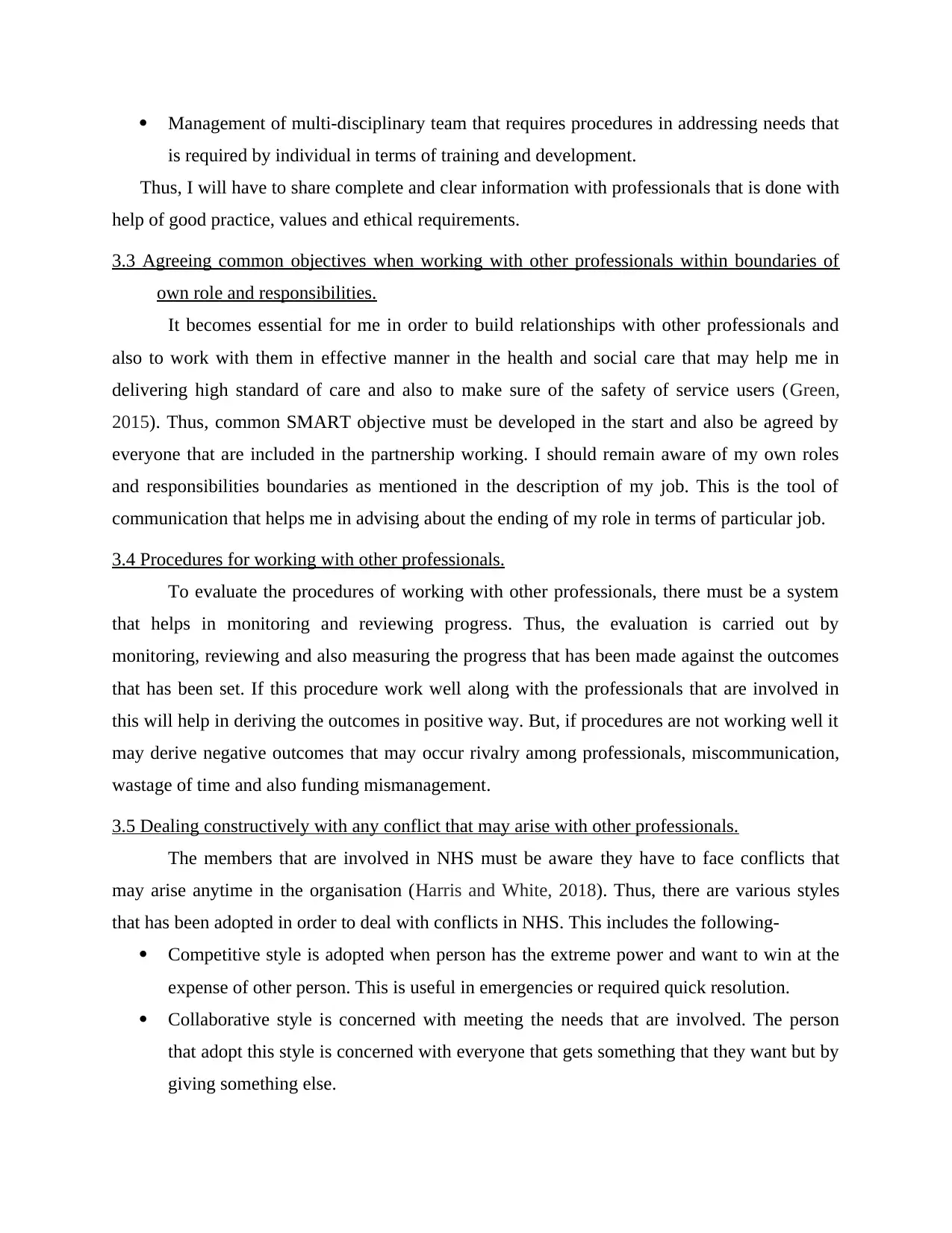
Management of multi-disciplinary team that requires procedures in addressing needs that
is required by individual in terms of training and development.
Thus, I will have to share complete and clear information with professionals that is done with
help of good practice, values and ethical requirements.
3.3 Agreeing common objectives when working with other professionals within boundaries of
own role and responsibilities.
It becomes essential for me in order to build relationships with other professionals and
also to work with them in effective manner in the health and social care that may help me in
delivering high standard of care and also to make sure of the safety of service users (Green,
2015). Thus, common SMART objective must be developed in the start and also be agreed by
everyone that are included in the partnership working. I should remain aware of my own roles
and responsibilities boundaries as mentioned in the description of my job. This is the tool of
communication that helps me in advising about the ending of my role in terms of particular job.
3.4 Procedures for working with other professionals.
To evaluate the procedures of working with other professionals, there must be a system
that helps in monitoring and reviewing progress. Thus, the evaluation is carried out by
monitoring, reviewing and also measuring the progress that has been made against the outcomes
that has been set. If this procedure work well along with the professionals that are involved in
this will help in deriving the outcomes in positive way. But, if procedures are not working well it
may derive negative outcomes that may occur rivalry among professionals, miscommunication,
wastage of time and also funding mismanagement.
3.5 Dealing constructively with any conflict that may arise with other professionals.
The members that are involved in NHS must be aware they have to face conflicts that
may arise anytime in the organisation (Harris and White, 2018). Thus, there are various styles
that has been adopted in order to deal with conflicts in NHS. This includes the following-
Competitive style is adopted when person has the extreme power and want to win at the
expense of other person. This is useful in emergencies or required quick resolution.
Collaborative style is concerned with meeting the needs that are involved. The person
that adopt this style is concerned with everyone that gets something that they want but by
giving something else.
is required by individual in terms of training and development.
Thus, I will have to share complete and clear information with professionals that is done with
help of good practice, values and ethical requirements.
3.3 Agreeing common objectives when working with other professionals within boundaries of
own role and responsibilities.
It becomes essential for me in order to build relationships with other professionals and
also to work with them in effective manner in the health and social care that may help me in
delivering high standard of care and also to make sure of the safety of service users (Green,
2015). Thus, common SMART objective must be developed in the start and also be agreed by
everyone that are included in the partnership working. I should remain aware of my own roles
and responsibilities boundaries as mentioned in the description of my job. This is the tool of
communication that helps me in advising about the ending of my role in terms of particular job.
3.4 Procedures for working with other professionals.
To evaluate the procedures of working with other professionals, there must be a system
that helps in monitoring and reviewing progress. Thus, the evaluation is carried out by
monitoring, reviewing and also measuring the progress that has been made against the outcomes
that has been set. If this procedure work well along with the professionals that are involved in
this will help in deriving the outcomes in positive way. But, if procedures are not working well it
may derive negative outcomes that may occur rivalry among professionals, miscommunication,
wastage of time and also funding mismanagement.
3.5 Dealing constructively with any conflict that may arise with other professionals.
The members that are involved in NHS must be aware they have to face conflicts that
may arise anytime in the organisation (Harris and White, 2018). Thus, there are various styles
that has been adopted in order to deal with conflicts in NHS. This includes the following-
Competitive style is adopted when person has the extreme power and want to win at the
expense of other person. This is useful in emergencies or required quick resolution.
Collaborative style is concerned with meeting the needs that are involved. The person
that adopt this style is concerned with everyone that gets something that they want but by
giving something else.
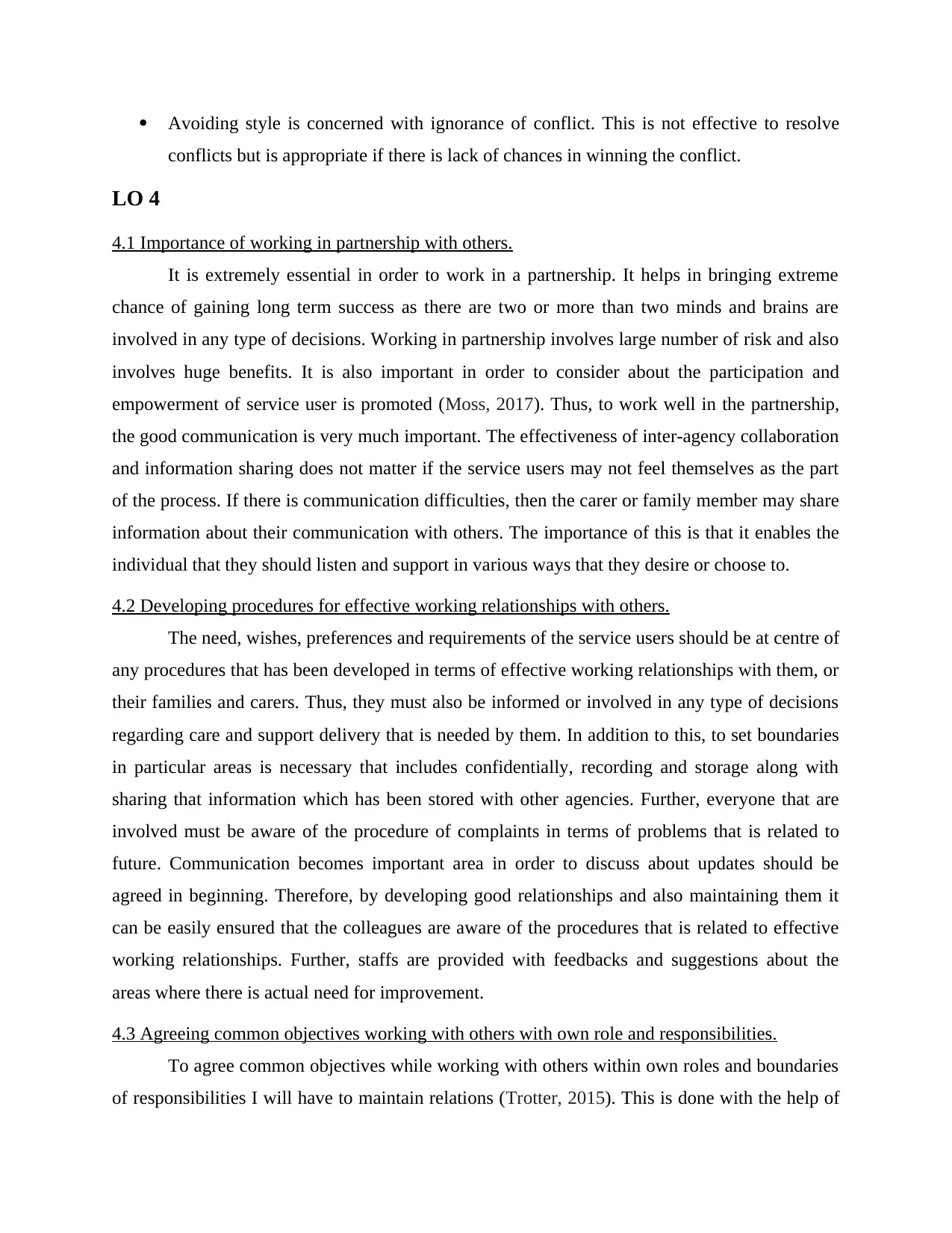
Avoiding style is concerned with ignorance of conflict. This is not effective to resolve
conflicts but is appropriate if there is lack of chances in winning the conflict.
LO 4
4.1 Importance of working in partnership with others.
It is extremely essential in order to work in a partnership. It helps in bringing extreme
chance of gaining long term success as there are two or more than two minds and brains are
involved in any type of decisions. Working in partnership involves large number of risk and also
involves huge benefits. It is also important in order to consider about the participation and
empowerment of service user is promoted (Moss, 2017). Thus, to work well in the partnership,
the good communication is very much important. The effectiveness of inter-agency collaboration
and information sharing does not matter if the service users may not feel themselves as the part
of the process. If there is communication difficulties, then the carer or family member may share
information about their communication with others. The importance of this is that it enables the
individual that they should listen and support in various ways that they desire or choose to.
4.2 Developing procedures for effective working relationships with others.
The need, wishes, preferences and requirements of the service users should be at centre of
any procedures that has been developed in terms of effective working relationships with them, or
their families and carers. Thus, they must also be informed or involved in any type of decisions
regarding care and support delivery that is needed by them. In addition to this, to set boundaries
in particular areas is necessary that includes confidentially, recording and storage along with
sharing that information which has been stored with other agencies. Further, everyone that are
involved must be aware of the procedure of complaints in terms of problems that is related to
future. Communication becomes important area in order to discuss about updates should be
agreed in beginning. Therefore, by developing good relationships and also maintaining them it
can be easily ensured that the colleagues are aware of the procedures that is related to effective
working relationships. Further, staffs are provided with feedbacks and suggestions about the
areas where there is actual need for improvement.
4.3 Agreeing common objectives working with others with own role and responsibilities.
To agree common objectives while working with others within own roles and boundaries
of responsibilities I will have to maintain relations (Trotter, 2015). This is done with the help of
conflicts but is appropriate if there is lack of chances in winning the conflict.
LO 4
4.1 Importance of working in partnership with others.
It is extremely essential in order to work in a partnership. It helps in bringing extreme
chance of gaining long term success as there are two or more than two minds and brains are
involved in any type of decisions. Working in partnership involves large number of risk and also
involves huge benefits. It is also important in order to consider about the participation and
empowerment of service user is promoted (Moss, 2017). Thus, to work well in the partnership,
the good communication is very much important. The effectiveness of inter-agency collaboration
and information sharing does not matter if the service users may not feel themselves as the part
of the process. If there is communication difficulties, then the carer or family member may share
information about their communication with others. The importance of this is that it enables the
individual that they should listen and support in various ways that they desire or choose to.
4.2 Developing procedures for effective working relationships with others.
The need, wishes, preferences and requirements of the service users should be at centre of
any procedures that has been developed in terms of effective working relationships with them, or
their families and carers. Thus, they must also be informed or involved in any type of decisions
regarding care and support delivery that is needed by them. In addition to this, to set boundaries
in particular areas is necessary that includes confidentially, recording and storage along with
sharing that information which has been stored with other agencies. Further, everyone that are
involved must be aware of the procedure of complaints in terms of problems that is related to
future. Communication becomes important area in order to discuss about updates should be
agreed in beginning. Therefore, by developing good relationships and also maintaining them it
can be easily ensured that the colleagues are aware of the procedures that is related to effective
working relationships. Further, staffs are provided with feedbacks and suggestions about the
areas where there is actual need for improvement.
4.3 Agreeing common objectives working with others with own role and responsibilities.
To agree common objectives while working with others within own roles and boundaries
of responsibilities I will have to maintain relations (Trotter, 2015). This is done with the help of
⊘ This is a preview!⊘
Do you want full access?
Subscribe today to unlock all pages.

Trusted by 1+ million students worldwide
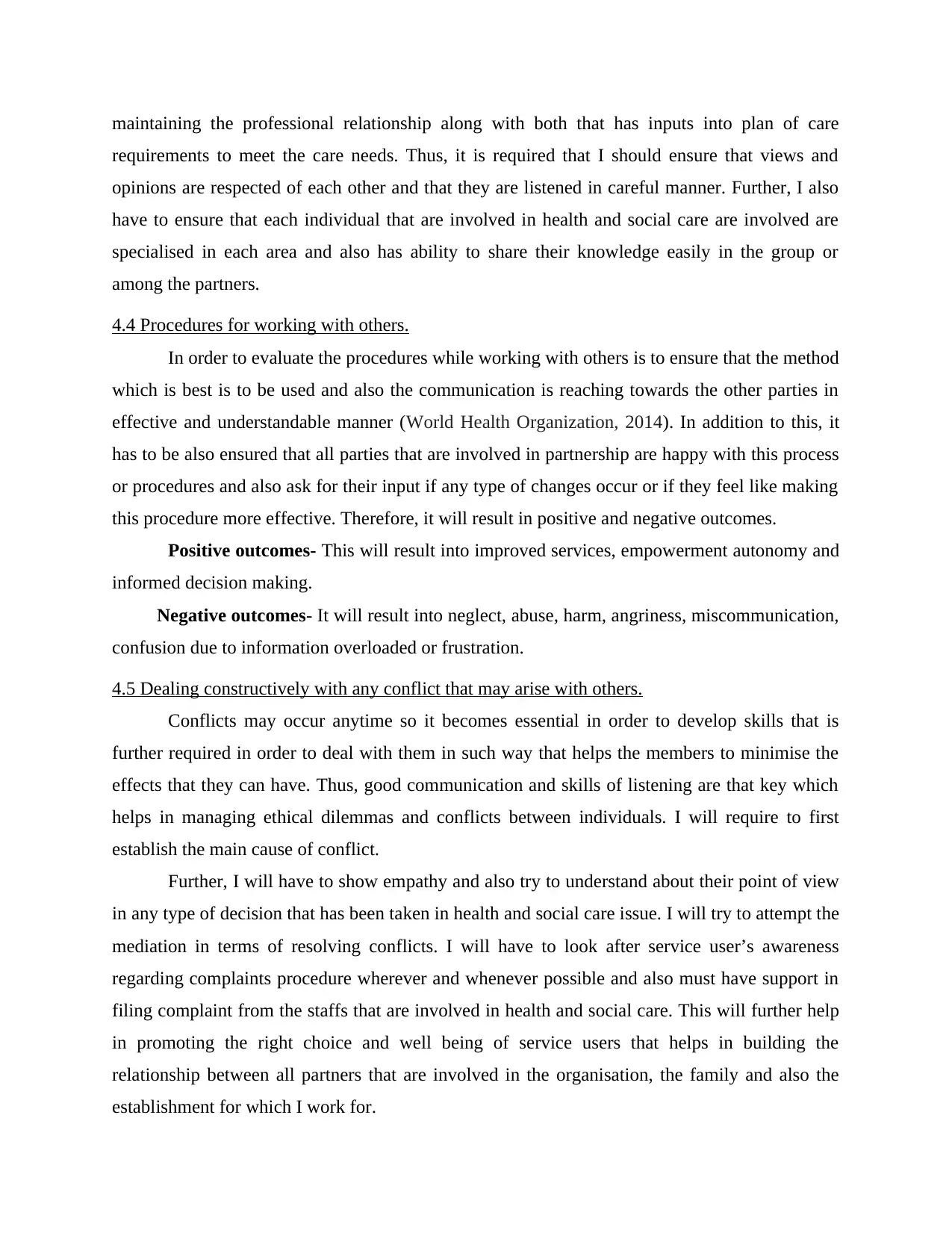
maintaining the professional relationship along with both that has inputs into plan of care
requirements to meet the care needs. Thus, it is required that I should ensure that views and
opinions are respected of each other and that they are listened in careful manner. Further, I also
have to ensure that each individual that are involved in health and social care are involved are
specialised in each area and also has ability to share their knowledge easily in the group or
among the partners.
4.4 Procedures for working with others.
In order to evaluate the procedures while working with others is to ensure that the method
which is best is to be used and also the communication is reaching towards the other parties in
effective and understandable manner (World Health Organization, 2014). In addition to this, it
has to be also ensured that all parties that are involved in partnership are happy with this process
or procedures and also ask for their input if any type of changes occur or if they feel like making
this procedure more effective. Therefore, it will result in positive and negative outcomes.
Positive outcomes- This will result into improved services, empowerment autonomy and
informed decision making.
Negative outcomes- It will result into neglect, abuse, harm, angriness, miscommunication,
confusion due to information overloaded or frustration.
4.5 Dealing constructively with any conflict that may arise with others.
Conflicts may occur anytime so it becomes essential in order to develop skills that is
further required in order to deal with them in such way that helps the members to minimise the
effects that they can have. Thus, good communication and skills of listening are that key which
helps in managing ethical dilemmas and conflicts between individuals. I will require to first
establish the main cause of conflict.
Further, I will have to show empathy and also try to understand about their point of view
in any type of decision that has been taken in health and social care issue. I will try to attempt the
mediation in terms of resolving conflicts. I will have to look after service user’s awareness
regarding complaints procedure wherever and whenever possible and also must have support in
filing complaint from the staffs that are involved in health and social care. This will further help
in promoting the right choice and well being of service users that helps in building the
relationship between all partners that are involved in the organisation, the family and also the
establishment for which I work for.
requirements to meet the care needs. Thus, it is required that I should ensure that views and
opinions are respected of each other and that they are listened in careful manner. Further, I also
have to ensure that each individual that are involved in health and social care are involved are
specialised in each area and also has ability to share their knowledge easily in the group or
among the partners.
4.4 Procedures for working with others.
In order to evaluate the procedures while working with others is to ensure that the method
which is best is to be used and also the communication is reaching towards the other parties in
effective and understandable manner (World Health Organization, 2014). In addition to this, it
has to be also ensured that all parties that are involved in partnership are happy with this process
or procedures and also ask for their input if any type of changes occur or if they feel like making
this procedure more effective. Therefore, it will result in positive and negative outcomes.
Positive outcomes- This will result into improved services, empowerment autonomy and
informed decision making.
Negative outcomes- It will result into neglect, abuse, harm, angriness, miscommunication,
confusion due to information overloaded or frustration.
4.5 Dealing constructively with any conflict that may arise with others.
Conflicts may occur anytime so it becomes essential in order to develop skills that is
further required in order to deal with them in such way that helps the members to minimise the
effects that they can have. Thus, good communication and skills of listening are that key which
helps in managing ethical dilemmas and conflicts between individuals. I will require to first
establish the main cause of conflict.
Further, I will have to show empathy and also try to understand about their point of view
in any type of decision that has been taken in health and social care issue. I will try to attempt the
mediation in terms of resolving conflicts. I will have to look after service user’s awareness
regarding complaints procedure wherever and whenever possible and also must have support in
filing complaint from the staffs that are involved in health and social care. This will further help
in promoting the right choice and well being of service users that helps in building the
relationship between all partners that are involved in the organisation, the family and also the
establishment for which I work for.
Paraphrase This Document
Need a fresh take? Get an instant paraphrase of this document with our AI Paraphraser
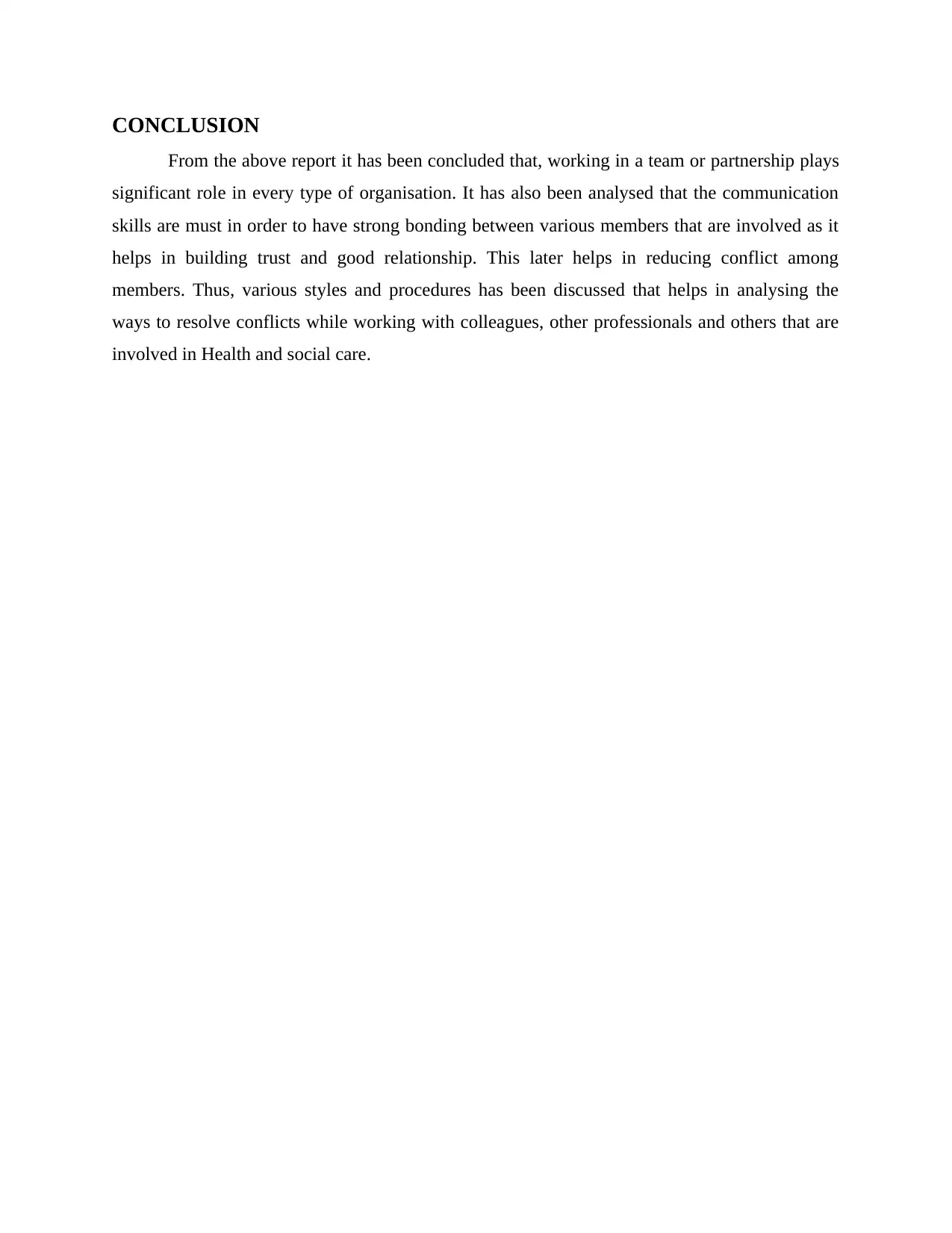
CONCLUSION
From the above report it has been concluded that, working in a team or partnership plays
significant role in every type of organisation. It has also been analysed that the communication
skills are must in order to have strong bonding between various members that are involved as it
helps in building trust and good relationship. This later helps in reducing conflict among
members. Thus, various styles and procedures has been discussed that helps in analysing the
ways to resolve conflicts while working with colleagues, other professionals and others that are
involved in Health and social care.
From the above report it has been concluded that, working in a team or partnership plays
significant role in every type of organisation. It has also been analysed that the communication
skills are must in order to have strong bonding between various members that are involved as it
helps in building trust and good relationship. This later helps in reducing conflict among
members. Thus, various styles and procedures has been discussed that helps in analysing the
ways to resolve conflicts while working with colleagues, other professionals and others that are
involved in Health and social care.
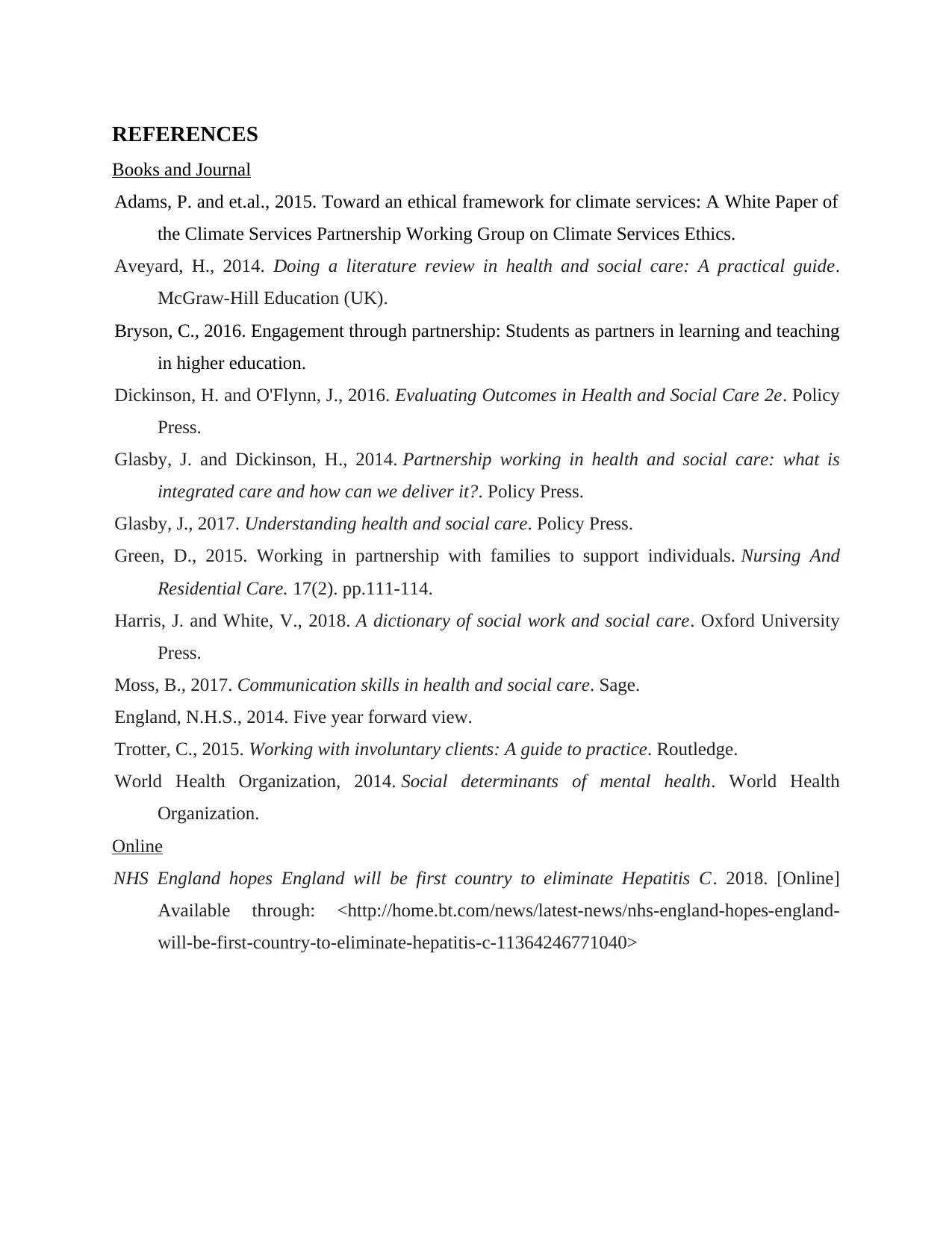
REFERENCES
Books and Journal
Adams, P. and et.al., 2015. Toward an ethical framework for climate services: A White Paper of
the Climate Services Partnership Working Group on Climate Services Ethics.
Aveyard, H., 2014. Doing a literature review in health and social care: A practical guide.
McGraw-Hill Education (UK).
Bryson, C., 2016. Engagement through partnership: Students as partners in learning and teaching
in higher education.
Dickinson, H. and O'Flynn, J., 2016. Evaluating Outcomes in Health and Social Care 2e. Policy
Press.
Glasby, J. and Dickinson, H., 2014. Partnership working in health and social care: what is
integrated care and how can we deliver it?. Policy Press.
Glasby, J., 2017. Understanding health and social care. Policy Press.
Green, D., 2015. Working in partnership with families to support individuals. Nursing And
Residential Care. 17(2). pp.111-114.
Harris, J. and White, V., 2018. A dictionary of social work and social care. Oxford University
Press.
Moss, B., 2017. Communication skills in health and social care. Sage.
England, N.H.S., 2014. Five year forward view.
Trotter, C., 2015. Working with involuntary clients: A guide to practice. Routledge.
World Health Organization, 2014. Social determinants of mental health. World Health
Organization.
Online
NHS England hopes England will be first country to eliminate Hepatitis C. 2018. [Online]
Available through: <http://home.bt.com/news/latest-news/nhs-england-hopes-england-
will-be-first-country-to-eliminate-hepatitis-c-11364246771040>
Books and Journal
Adams, P. and et.al., 2015. Toward an ethical framework for climate services: A White Paper of
the Climate Services Partnership Working Group on Climate Services Ethics.
Aveyard, H., 2014. Doing a literature review in health and social care: A practical guide.
McGraw-Hill Education (UK).
Bryson, C., 2016. Engagement through partnership: Students as partners in learning and teaching
in higher education.
Dickinson, H. and O'Flynn, J., 2016. Evaluating Outcomes in Health and Social Care 2e. Policy
Press.
Glasby, J. and Dickinson, H., 2014. Partnership working in health and social care: what is
integrated care and how can we deliver it?. Policy Press.
Glasby, J., 2017. Understanding health and social care. Policy Press.
Green, D., 2015. Working in partnership with families to support individuals. Nursing And
Residential Care. 17(2). pp.111-114.
Harris, J. and White, V., 2018. A dictionary of social work and social care. Oxford University
Press.
Moss, B., 2017. Communication skills in health and social care. Sage.
England, N.H.S., 2014. Five year forward view.
Trotter, C., 2015. Working with involuntary clients: A guide to practice. Routledge.
World Health Organization, 2014. Social determinants of mental health. World Health
Organization.
Online
NHS England hopes England will be first country to eliminate Hepatitis C. 2018. [Online]
Available through: <http://home.bt.com/news/latest-news/nhs-england-hopes-england-
will-be-first-country-to-eliminate-hepatitis-c-11364246771040>
⊘ This is a preview!⊘
Do you want full access?
Subscribe today to unlock all pages.

Trusted by 1+ million students worldwide
1 out of 12
Related Documents
Your All-in-One AI-Powered Toolkit for Academic Success.
+13062052269
info@desklib.com
Available 24*7 on WhatsApp / Email
![[object Object]](/_next/static/media/star-bottom.7253800d.svg)
Unlock your academic potential
Copyright © 2020–2025 A2Z Services. All Rights Reserved. Developed and managed by ZUCOL.




